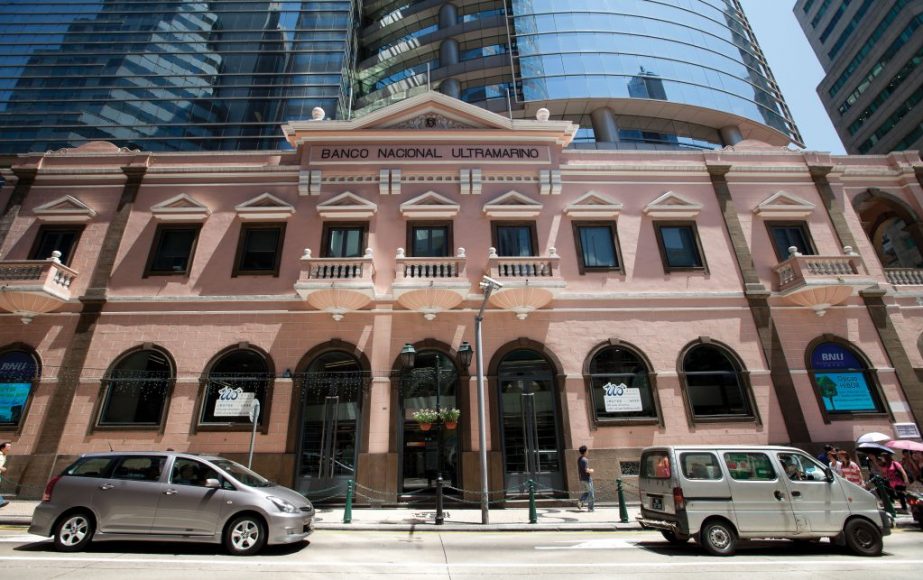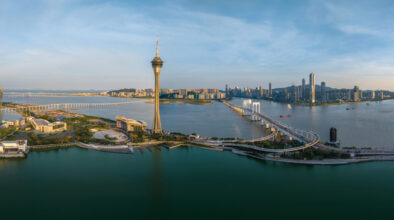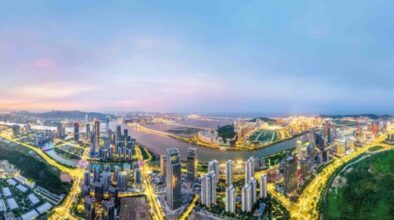Despite the obvious success the gaming dollar has brought to Macao, its economy is on the verge of change. There’s a new financial model brewing in the city – and it’s a globally minded one.

It is no secret that Macao’s economic success post-1999 is largely down to its thriving gaming industry. Since 2006, the city has been the world’s largest centre for gaming, overtaking Las Vegas in the US that year and never looking back since. In 2017, according to The Economist Intelligence Unit, gaming generated almost half of the city’s local GDP. Real estate came a distant second at a little over 10 per cent.
The entertainment complexes and their games have helped to bring the territory huge wealth over the years. In 1999, Macao’s GDP was US$6.46 billion – or MOP 51.87 billion – and last year, the city’s GDP stood at US$54.96 billion – or MOP 444.67 billion – a stark reminder of how much the economy has boomed since the handover of its administration to China. And the wealth over these two decades has been spread around too, with its GDP per capita reaching US$83,425 – or MOP 673,481 – last year, up from US$15,186 – or MOP 121,363 – in 1999. This is one of the best GDP per capita rates in the world.
But despite the prosperity the gaming industry has brought, China’s central government has pressed Macao to diversify its economy away from the dice and the cards. The local authorities have, over the past few years, instead placed more focus on fields such as conferences and exhibitions – and, so far, they’ve been showing great signs of success.
It hasn’t all been stellar of late – the International Monetary Fund last month predicted that GDP will be down by 1.3 per cent this year and also expected a further contraction of 1.1 per cent next year – but efforts are nevertheless ongoing to broaden the base of the SAR’s economy. The downturn – said to be due to a decline in investment and exports, which in turn is affected by gaming tourism – could be a reminder that Macao needs to keep diversifying away from relying heavily on the gaming industry.
Investing abroad
So how is the city looking to diversify? One way is to look far afield. Green pastures in Portugal may seem a world away from Macao’s bustling streets but there’s money to be made in the European country. Macao-based investment and services firm CESL Asia last month acquired Portuguese farming group Monte do Pasto, or MdP, the nation’s largest beef producer, investing EUR 40 million – or MOP 357 million – into 3,700 hectares of agricultural land in the south of Portugal that has been mainly used as pasture for cattle. This land lies in the municipalities of Cuba and Alvito in the Alentejo region.
A statement from CESL Asia following the acquisition, which was supported by the Bank of China, said that the deal aims to continue the development of social and economic co-operation between Portugal, China, Macao and African Portuguese-speaking countries.
Macao could therefore diversify away from relying on the gaming industry and thus become more of a service platform, investing in and linking to countries and organisations across the globe. The head of CESL Asia, António Trindade, sees this sort of diversification as not just necessary but inevitable.

According to Trindade, the key to economic diversification could be ‘a combination of both’ the development of the platform with Portuguese-speaking countries and Macao’s role in the Greater Bay Area. And the financial services industry will also have to take centre-stage, says the trained engineer.
Great expectations

Macao may traditionally be an important platform for all Portuguese-speaking countries, however last year it became all the more important with the unveiling of the Greater Bay Area Outline Development Plan. In this Chinese government plan, the city was highlighted as a financial platform for Portuguese-speaking countries. The city is also expected to assist in the Belt and Road Initiative.
Leading academic José Luís de Sales Marques, president of the Institute of European Studies of Macau, identifies a ‘great expectation’ in Macao’s financial domain. “The Greater Bay Area Outline Development Plan,” he says in recently published book ‘The Guangdong-Hong Kong-Macau Greater Bay Area: The Challenge of the Century for Macau’, “outlines that Macao will become a ‘green’ financial services provider platform in the Sino-Lusophone relationship. Macao should develop special financial products and services, such as leasing, and study the viability of establishing in Macao a stock exchange in CNY [RMB].”
The Greater Bay project aims to create a world metropolis that integrates Hong Kong, Macao and nine cities in Guangdong province in a region of about 70 million people which already boasts a collective GDP of more than US$1.5 trillion – or MOP 12.1 trillion – making up around 12 per cent of China’s national GDP.

Other important services that could be offered in Macao, claims Sales Marques, include a secure export credit system, ‘a long-term aspiration of traders dealing with Portuguese-speaking countries’. He also adds that a bigger local participation in the management of the China-Portuguese-speaking Countries Co-operation and Development Fund, based in Macao, is necessary. The fund, which has the China Development Bank as its sponsor, aims to promote the economic and commercial co-operation between China and the Portuguese-speaking countries, particularly in relation to members’ development, with the total value of financing corresponding to US$1 billion – just over MOP 8 billion. It has been reported that the fund has invested more than US$120 million – or MOP 969 million – in five projects so far.
Given that Macao has privileged access to Africa, South America and Europe through its Portuguese-speaking countries platform, the Greater Bay Area Outline Development Plan also foresees the MSAR’s participation, in due time, in several regional and multinational funds, such as the Silk Road Fund, the Asian Infrastructure Investment Bank, the Fund for Sino-Latin-American Production and the China-Africa Development Fund, mentions Sales Marques. He also suggests that Macao develops adequate study programmes about Africa and Latin America, encompassing their nations’ political, economic and socio-economic environments.
Collaboration among the financial institutions that are based in Macao – namely the Banco Nacional Ultramarino (BNU) and the local branch of the Bank of China – is already ongoing to establish a platform to explore potential business opportunities, according to both banks. The banks are collaborating to respond to market needs in a faster and more agile way, offering a wide range of products and services to companies, like leasing, which BNU is now launching.

Li Guang, general manager of the Bank of China’s Macao branch, says that the branch has successfully been selling new financial products in Macao like bonds, which allow companies or governments access to finance in the present with the bond holders having the chance to make good profits in the future. The issuances have included the first ‘Guangdong-Hong Kong-Macao Greater Bay’ debt securities in MOP and the first ‘Lotus’ bonds in RMB, as well as ‘Belt and Road’ bonds. Macao residents have been the major investors in these products, according to the Bank of China.
The financial industry development will have to happen, otherwise changing the economic system in Macao will be impossible. The existing system is unsustainable.
Banking on it
The Bank of China has also been actively supporting overseas investment, according to Li Guang, including the financing of a Mainland China company to acquire Portugal’s largest insurance company, supporting the investment activities of Macao companies in Portuguese-speaking countries and providing funds to buy farms in Portugal. The bank is Macao’s currency issuer, along with the BNU.
The Bank of China’s Macao branch is integrated in the Cross-Border Inter-Bank Payments System (CIPS), which offers clearing and settlement services for its participants in RMB operations abroad, including in Portuguese-speaking countries.
Carlos Cid Álvares, CEO of the BNU, explains that local financial institutions, together with the Monetary Authority of Macao, have worked closely together to broaden the supply of products and services available in Macao, thereby meeting the needs of entrepreneurs and encouraging the creation of appropriate financial instruments to further deepen Sino-Lusophone economic relations.

In 2015, BNU established a protocol with the Bank of China in Macao to join efforts in strengthening ties to countries like Portugal, Brazil, Mozambique and Angola. Agreements aim to jointly promote business developments between China and Portuguese-speaking countries and create synergies and a broader referral network for new opportunities.
This year, BNU also became a member of the Industrial and Commercial Bank of China (ICBC)-led Belt and Road Inter-Bank Regular Cooperation Mechanism and signed a memorandum of understanding with Macao’s Trade and Investment Promotion Agency – the IPIM – during the 24th Macao International Fair to strengthen mutual collaboration in attracting more businesses to the territory.
The bank also began offering financial leasing services earlier this year. “This is a very relevant product for local entrepreneurs,” says Cid Álvares, “particularly in the context of small and medium enterprises, which might not be eligible for conventional loans.” According to BNU’s CEO, the bank is also looking into the possibility of implementing an export insurance service that would enable its customers to mitigate the risks that are inherent when exporting goods and thereby encouraging business growth between Macao, Portuguese-speaking countries and China.
BNU’s CEO is confident that Macao will diversify its financial offering and ‘gradually become an international reference, namely in support of RMB internationalisation and co-operation with Portuguese-speaking countries’. New services could include the issuance of debt by local or Chinese companies which ‘requires a concerted effort by the various actors’, says Cid Álvares, including organisations like governmental bodies ‘in defining standards’, financial agents and brokers. More and more products are becoming available in the financial market and local bankers expect to attract capital from China, Hong Kong and beyond.
Macao could increase its co-operation with financial agents from neighbouring regions, such as its sister SAR, a famous financial hub. “In the future,” says Cid Álvares, “both Chinese and Portuguese-speaking companies will have the quintessential centre in Macao where they can find the financial resources best suited to their business and investment needs, as well as a legal and regulatory environment conducive to investment and the promotion of business.”
The special region’s future may not be one dedicated only to the gaming dollar, then. There’s a new financial and economic dawn on the horizon for Macao that could benefit the city, the region and beyond in the coming years.
Macao’s economy in figures
Here are some economical stats for 2018…
 Median monthly employment earnings
Median monthly employment earnings
MOP 16,000
Value of merchandise exports
MOP 15,886 million
Value of merchandise imports
MOP 107,120 million
Value of retail sales
MOP 76,807 million
Tax revenue from gaming sector
MOP 113,512 million
Gross gaming revenue
MOP 303,879 million
GDP (at current price)
MOP 444,666 million
GDP (chain volume measure)
MOP 429,497 million
GDP per capita (at current price)
MOP 673,481
GDP per capita (chain volume measure)
MOP 650,507



